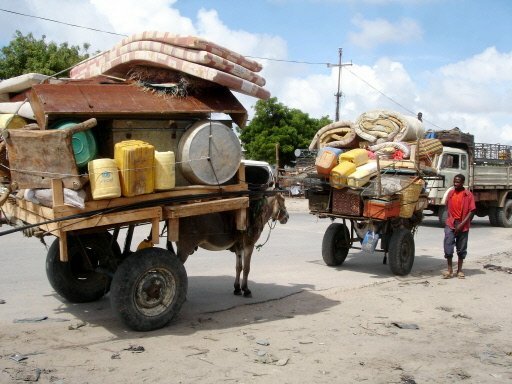Mogadishu residents flee fresh offensive
 Mogadishu – Residents fled Mogadishu on Friday as pro-government forces scrambled to contain an insurgent onslaught that has left more than 100 dead and displaced tens of thousands over the past week.
Mogadishu – Residents fled Mogadishu on Friday as pro-government forces scrambled to contain an insurgent onslaught that has left more than 100 dead and displaced tens of thousands over the past week.
The embattled government, entrenched in an ever-shrinking tract of the city, vowed on Friday to “eliminate” the Islamist extremists.
And it appointed a new army chief after its failure thus far to repel an offensive that has heightened international concerns over the lawless nation.
“The government’s decision is clear,” Abdurahman Abdi Sahakur, Somali government’s Planning and Foreign Relations Minister told reporters.
“We need to eliminate the violent groups in the capital within the coming days. We will fight them to death,” he added.
In New York meanwhile, the United Nations Security Council condemned attempts by the radical Islamists to oust the government and expressed concern at reports that Eritrea was supplying them with weapons, in a non-binding statement.
The UNHCR, the UN’s refugee agency, said fighting had “so far claimed the lives of more than 135 people.” Its workers had also counted 315 wounded and calculated 30 000 had been forced to flee their homes.
“Hospitals in central Mogadishu are reported to be overwhelmed by the large number of casualties in need of urgent medical attention,” the UNHCR statement said.
Aid agency Medecins Sans Frontierer (Doctors Without Borders, MSF) said on Friday it had been forced to close an out-patient clinic in northern Mogadishu “for fear its staff could be caught in crossfire”.
Residents had deserted the area to overcrowded camps while some were camped along roadsides, the agency added.
Earlier Friday, Somali Information Minister Farhan Ali Mohamoud said the new military chief Yusuf Osman Dhumal would command military operations in the capital.
The rebels meanwhile maintained their positions in the seaside capital, in trenches along streets near the presidential palace.
“The situation is calm… we have not heard any gunshot so far, but we are not sure how long it will last,” said resident Mohamed Moalim Dahir.
President Sharif Sheikh Ahmed was holed up in the presidential compound under the protection of a 4 000-strong African Union peacekeeping force.
The rebel forces launched an offensive against the transitional government on May 7.
They consist mainly of fighters from the Shebab, a homegrown radical group whose leaders are suspected of links to al-Qaeda; and the Hezb al-Islamiya, another armed organisation loyal to hardline opposition leader Sheikh Hassan Dahir Aweys Aweys.
They say they are determined to topple Sharif’s fledgling administration.
UN special envoy for Somalia Ahmedou Ould Abdallah told reporters in Nairobi: “Foreign fighters are committed to destabilising Somalia, they are attacking a legitimate government”.
“Some of the foreign fighters are there for religious motivations and other are mercenaries,” he added.
Regional intelligence sources estimate 450 foreign fighters are working with the Shebab.
The hardliners who want Sharia law imposed across the Horn of Africa nation, have admitted receiving support from foreign jihadists.
The UN Security Council expressed concern “over reports that Eritrea has supplied arms to those opposing the legitimate government of Somalia in breach of the UN (17-year-old) arms embargo.”
“The ongoing attempts to take power by force can only delay the political process and prolong the suffering of the Somali people,” it said.
It called on its sanctions monitoring panel to investigate.
A country of seven million people, Somalia has had no effective central authority since former president Mohamed Siad Barre was ousted in 1991, setting off a bloody cycle of clashes between rival factions.
Pirate attacks in the Indian Ocean and Gulf of Aden by Somali groups have accentuated international concerns. – AFP
Comments
comments
 Calendar
Calendar






































